Key takeaways:
- Plastic pollution poses significant threats to marine life and ecosystems, necessitating immediate action towards sustainable practices and effective legislation.
- Current plastic laws vary globally, with some areas implementing bans and directives while others lag behind, exacerbating pollution issues.
- Community engagement and education are vital for driving change and supporting stronger plastic legislation to protect ocean health for future generations.
- Emerging alternatives to traditional plastics and the activism of younger generations signal a hopeful future for more robust plastic regulations and sustainability efforts.
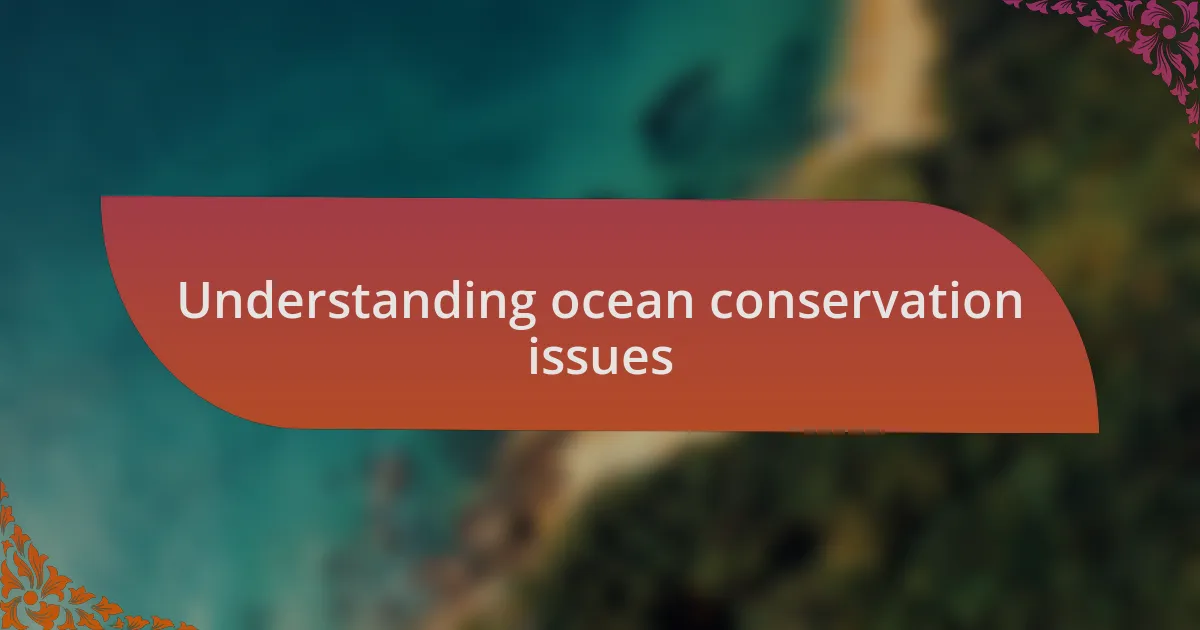
Understanding ocean conservation issues
Ocean conservation issues are complex and multifaceted. From my experience volunteering at coastal clean-ups, I’ve seen firsthand how plastic pollution chokes marine life, leaving haunting reminders in the form of discarded nets and bottles. How can we effectively address these visible symptoms without tackling the root causes of pollution?
When I reflect on the stunning biodiversity beneath the waves, it’s heartbreaking to think that we are losing countless species every day due to human activity. I often wonder: what would our world look like if we prioritized sustainable practices over convenience? The reality is that each small action we take can contribute to a larger movement toward protecting these vital ecosystems.
Climate change is another critical issue affecting our oceans. Rising temperatures and acidification pose significant threats to coral reefs and fisheries, which are vital for food security and community livelihoods. I remember the awe I felt while snorkeling above a vibrant reef, which made me realize that preserving these underwater wonders is not just an environmental concern but a deeply personal one. How do we ensure future generations can experience the beauty and resources our oceans provide?
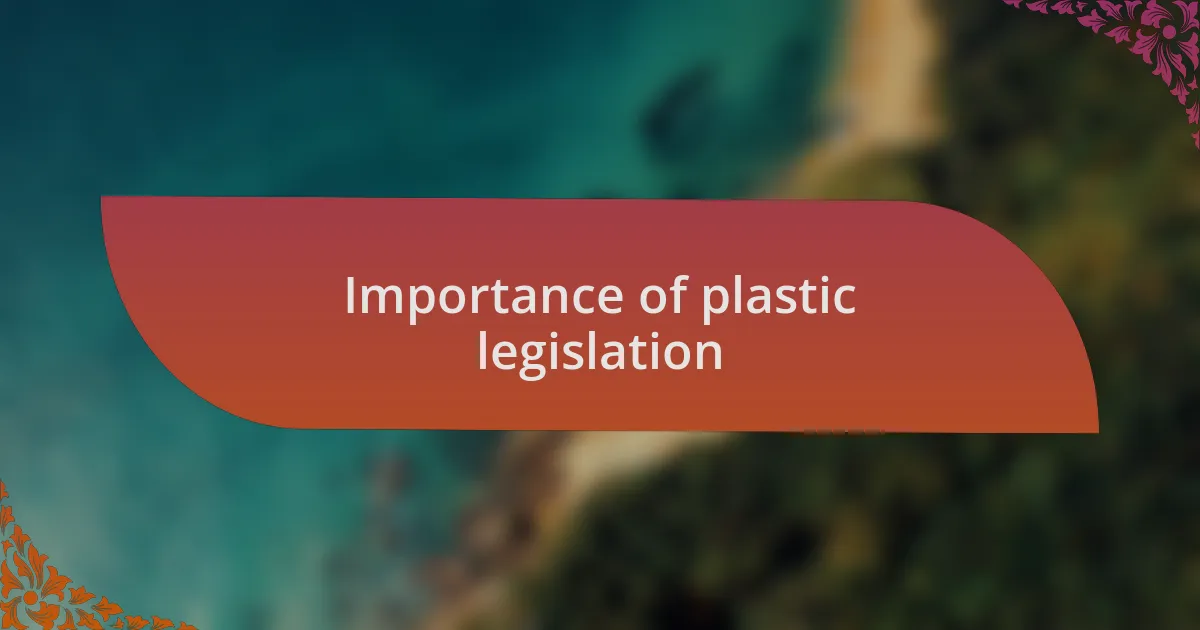
Importance of plastic legislation
Plastic legislation is crucial because it sets the framework for reducing plastic waste and protecting marine environments. I’ve often witnessed the stark contrast between clean beaches and those littered with debris, and it drives home the need for regulatory action. Have you ever walked along a polluted shore and felt the weight of responsibility to advocate for change?
Moreover, effective legislation can spark innovation in sustainable materials and recycling processes. I remember attending a seminar where entrepreneurs presented viable alternatives to single-use plastics, and it was inspiring to see how policy can promote such inventive solutions. How empowering would it be to live in a world where plastic was a relic of the past?
Ultimately, well-crafted laws not only mitigate harm but also educate communities about responsible consumption. I once participated in a local campaign that raised awareness about plastic pollution, and it reinforced my belief that informed communities can drive real change. Isn’t it time we elevate our understanding and commitment to preserving our oceans for generations to come?
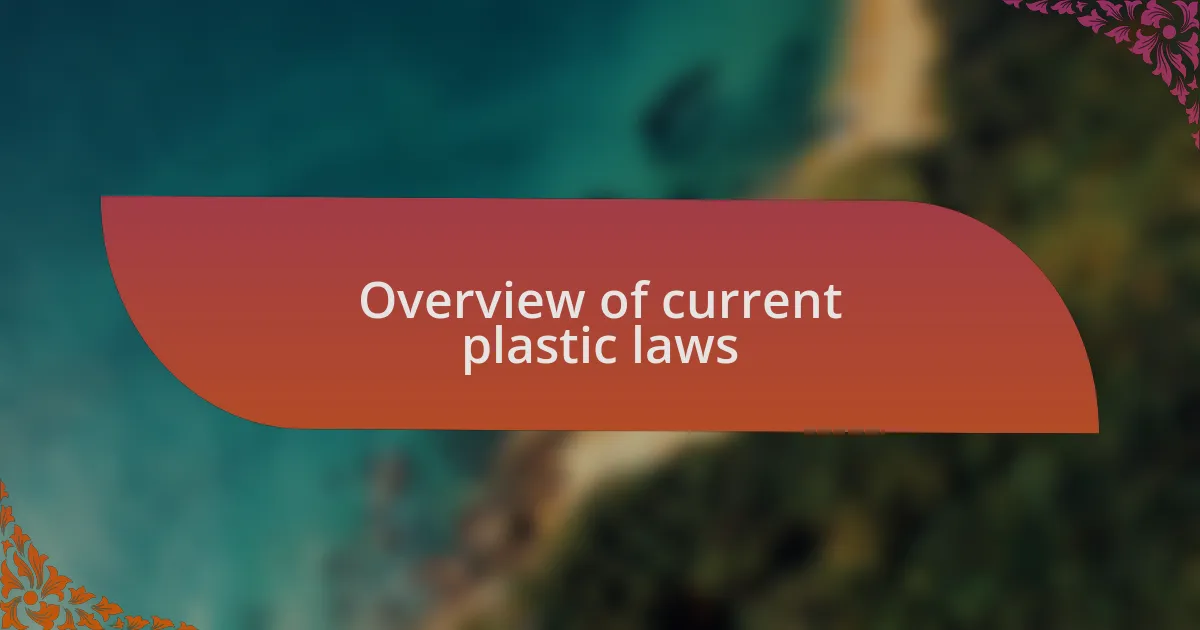
Overview of current plastic laws
Current plastic laws vary widely across the globe, reflecting differing priorities and levels of urgency regarding plastic pollution. In some countries, like the UK, there are bans on plastic straws and stirrers, aiming to curb unnecessary waste. I remember feeling a sense of relief when I learned that local businesses were quickly adapting to these regulations by offering more sustainable alternatives—what a shift in mindset!
Meanwhile, the European Union is pushing forward with its Single-Use Plastics Directive, targeting key items that frequently pollute our oceans. I can still picture the day I attended a beach cleanup where we collected countless plastic bottles, reminding me of the tangible impact such legislation could have on preserving marine life. Isn’t it incredible to think that such policies could drive real change in our oceans?
In contrast, some regions lag behind in implementing effective laws, often due to economic pressures or lack of political will. This disparity is concerning—when I visited a coastal community struggling with plastic waste, the local fishermen shared stories of dwindling fish populations linked to pollution. How can we expect future generations to thrive in the ocean when so many areas are still grappling with the consequences of outdated or nonexistent legislation?
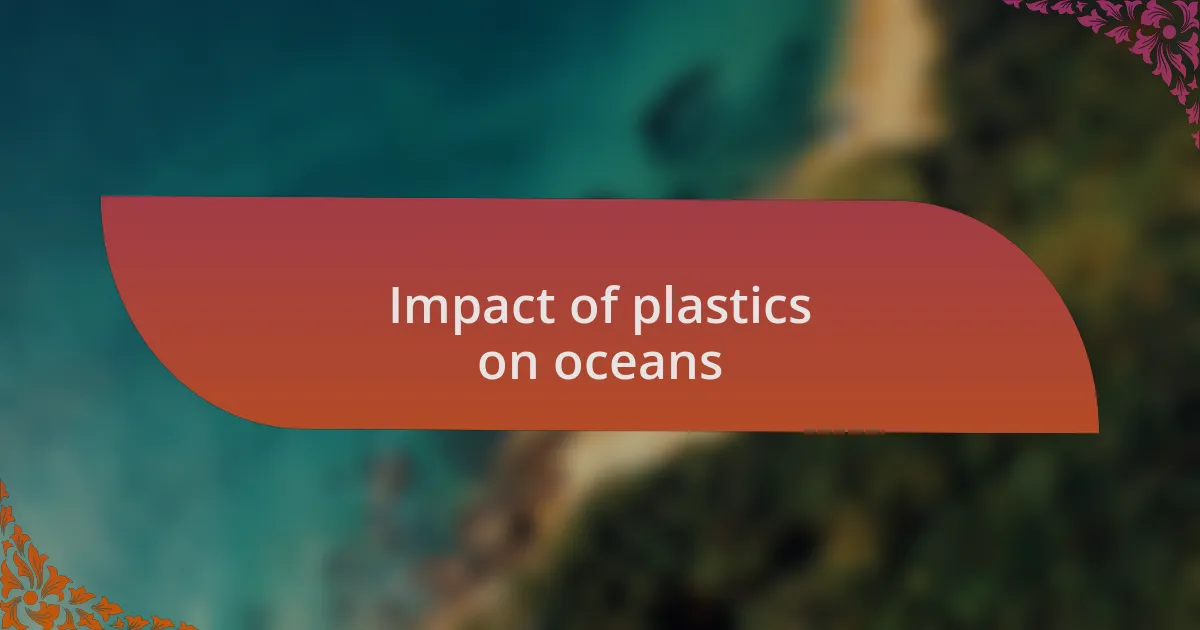
Impact of plastics on oceans
The presence of plastics in our oceans has dire consequences for marine ecosystems. I recall a day diving in a coral reef and being shocked to see tangled marine life struggling with plastic debris. It struck me then how intertwined our actions are with the health of the oceans. Have we fully grasped that every piece of plastic we use can eventually find its way into the water?
Not only do plastics harm marine creatures physically, but they also introduce toxic substances into the food chain. During a recent visit to a coastal research facility, I learned firsthand how microplastics infiltrate the diets of fish and other sea creatures. This left me pondering: How can we ignore the fact that these toxins might eventually reach our dinner plates?
Moreover, the sheer volume of plastic waste affects oceanic habitats, disrupting the delicate balance of these environments. I experienced a moment of profound sadness while walking along a beach littered with plastic—seeing the once-vibrant ecosystem choked by human negligence. It raised a question in my mind: What will it take for us to realize that protecting our oceans is protecting ourselves?
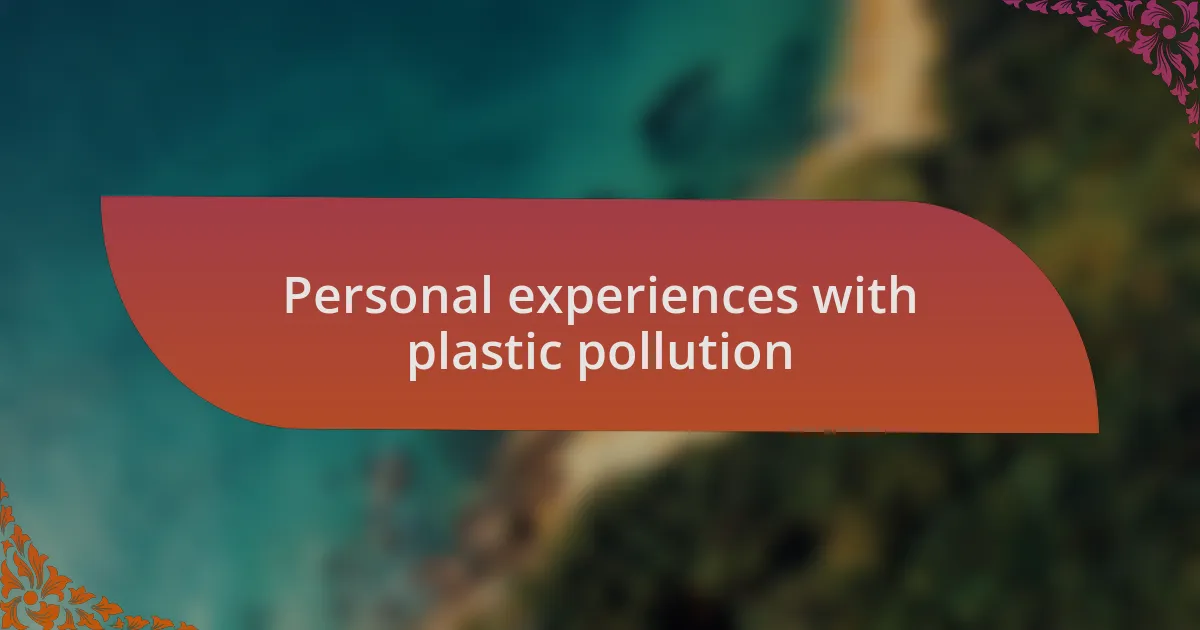
Personal experiences with plastic pollution
I have vivid memories of volunteering for a beach cleanup last summer. As I picked up piece after piece of plastic, I was struck by the realization of how our daily habits contribute to ocean pollution. Seeing children helping out, curious about the ocean, made me wonder: what type of future are we leaving for them if we continue on this path?
One time, I mistook a floating plastic bag for a jellyfish while kayaking. The moment I realized my error, I felt a wave of frustration wash over me. It made me think—how many marine animals face a similar fate, only without the chance to escape? That incident fueled my passion for advocating against single-use plastics.
During a recent trip to a coastal city, I wandered through a vibrant marine festival, yet I was disheartened by the plastic straws and cups littering the area. Amidst the celebration, I couldn’t shake off the feeling that we are celebrating our oceans while still damaging them. This contradiction really hit home for me and affirmed my belief that change must start now, for the sake of our oceans and the future generations who depend on them.
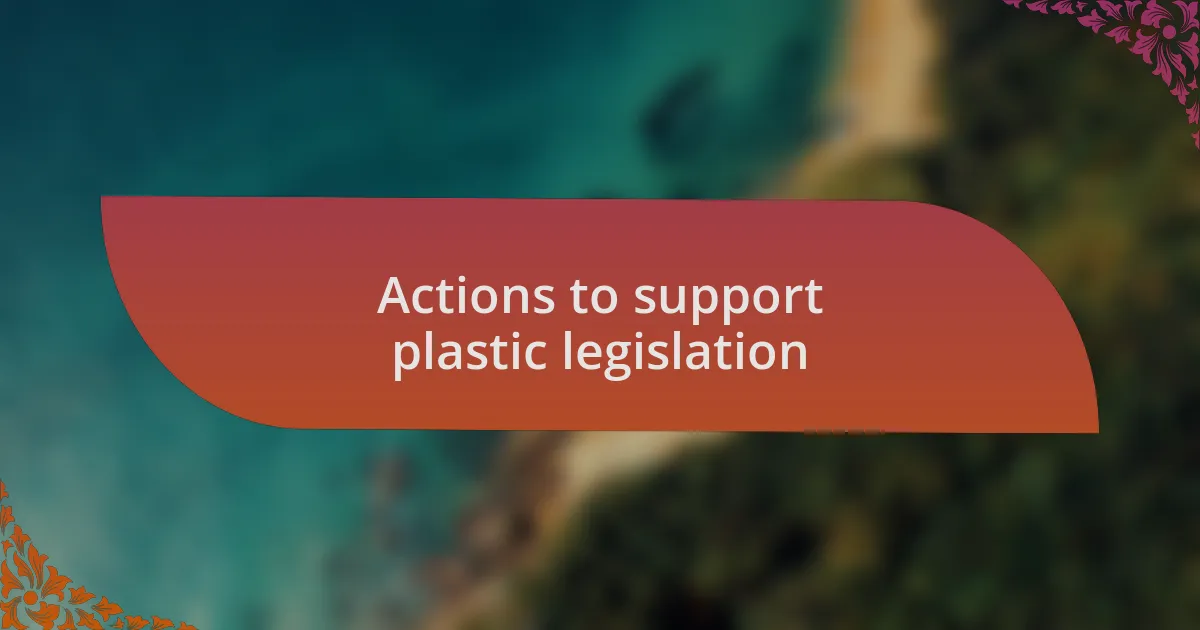
Actions to support plastic legislation
Supporting plastic legislation requires both individual and collective actions that resonate with our shared responsibility towards the environment. For instance, I recall attending a local town hall meeting where citizens rallied to advocate for a ban on plastic bags. The energy in the room was palpable; it was inspiring to see people passionately voicing their concerns and proposing realistic alternatives, such as reusable bags. Have you ever felt that surge of hope when a community comes together, united by a common cause?
Another powerful action is engaging with lawmakers directly. I once reached out to my elected representative to express my views on plastic waste and the importance of stricter regulations. It was a simple email, but it felt empowering to know that my voice could contribute to a larger movement. Have you considered making your opinion known? Every small action counts, especially when we use our voices to push for change.
Educating others about the impacts of plastic pollution also plays a crucial role. I’ve hosted workshops in my neighborhood, discussing the effects of plastics on marine life and sharing tips on reducing plastic use. Seeing people actively engage and transform their habits was incredibly rewarding. Isn’t it fascinating how knowledge can spark change? Each conversation brings us closer to a collective understanding of the urgent need for strong plastic legislation.
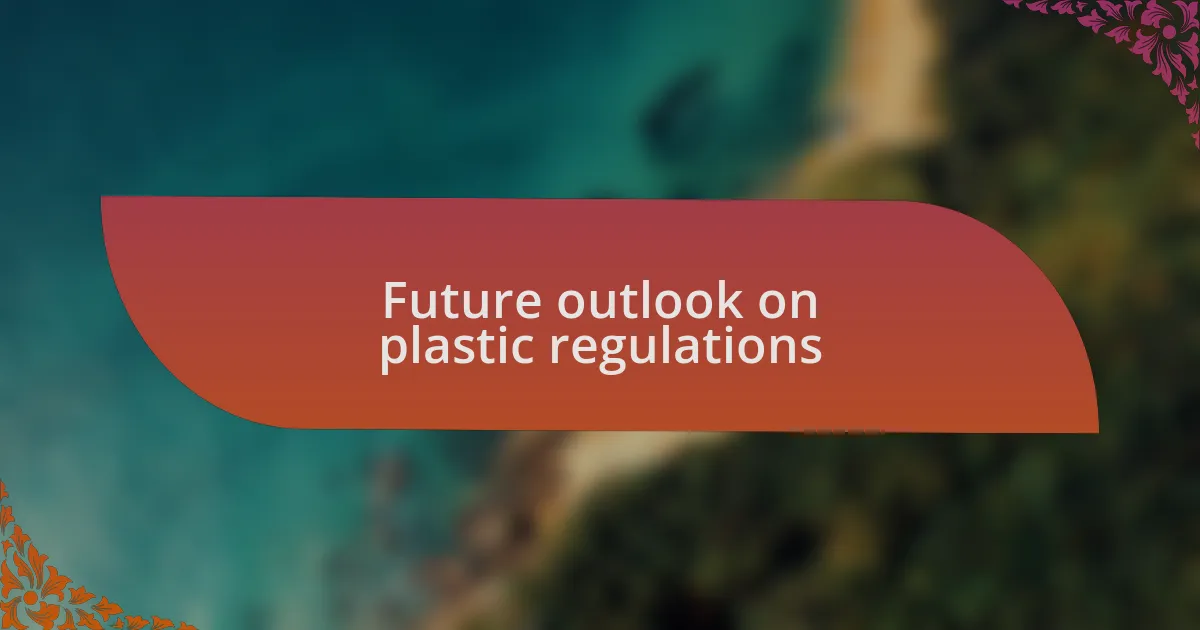
Future outlook on plastic regulations
As I look ahead, it seems evident that the future of plastic regulations hinges on the global movement towards sustainability. I remember a recent conference I attended, where experts passionately discussed innovative alternatives to traditional plastics, like biodegradable materials made from seaweed. It left me wondering: could these alternatives reshape our relationship with plastics entirely?
Furthermore, I’ve observed that younger generations are becoming more vocal and demanding change faster than ever before. Just last week, I overheard a group of students at a café debating the necessity of stricter legislation on single-use plastics. Their enthusiasm was contagious, prompting me to reflect on how this emerging wave of activism could influence future policies. Isn’t it both exciting and reassuring to think about the voices that will shape our regulations?
Looking at the trend of international agreements, like the recent commitments made at climate summits, I’m cautiously optimistic. Countries are increasingly recognizing the importance of collaborative actions to address plastic pollution in our oceans. I can’t help but think about how one united front could amplify efforts and lead to significant legislative changes globally. Will we rise to the challenge together?